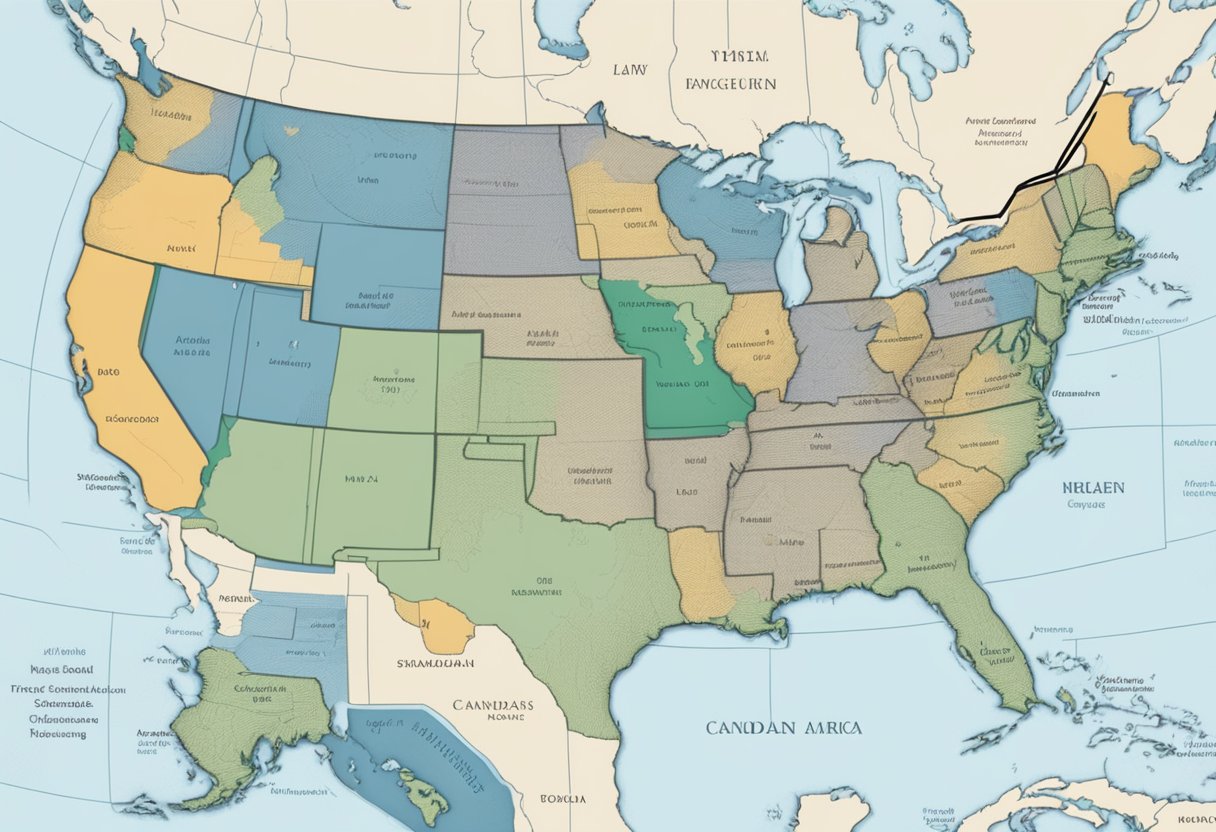Sports betting in both the United States and Canada has undergone significant changes in recent years. In August 2021, the Canadian government passed Bill C-218, which decriminalized single-game sports betting across the country. This landmark legislation allows each province to create its own regulatory framework for sports wagering, similar to how American states operate under their respective regulations.

The emergence of regulated markets in both countries has created unprecedented connectivity between American and Canadian bettors, though important legal distinctions remain. When crossing the border, sports enthusiasts need to understand the different rules that apply in each jurisdiction, as regulations vary not just between countries but also between individual states and provinces.
For Canadians and Americans living near the border, these evolving laws present both opportunities and challenges. While more betting options are now available in both countries, players must navigate complex regulatory landscapes that can change depending on which side of the border they’re on. Understanding these differences is crucial for anyone looking to participate in cross-border betting activities.
Historical Context of Betting in North America

Betting has deep roots in North American culture, evolving from underground activities to regulated industries through different legal frameworks in the United States and Canada. Both countries have seen significant shifts in their approach to gambling, particularly sports wagering.
Evolution of Betting Laws in the US
Early American betting was largely unregulated until the late 19th century when anti-gambling sentiments grew. By the 1910s, most forms of gambling were outlawed across the United States.
The Great Depression prompted some relaxation of gambling laws, with Nevada legalizing casino gambling in 1931 to boost its economy. Other states gradually followed with limited forms of legal betting.
A major shift came with the 1992 Professional and Amateur Sports Protection Act (PASPA), which effectively banned sports betting nationwide except in Nevada and a few states with existing sports lotteries.
The landscape changed dramatically in 2018 when the US Supreme Court struck down PASPA, allowing individual states to legalize sports betting. Since then, more than 30 states have introduced legal sports wagering in some form.
Evolution of Betting Laws in Canada
Canada’s betting history began with unregulated gambling until the Criminal Code of Canada in 1892 banned all gambling activities. This comprehensive law shaped Canadian gambling policy for decades.
In 1969, Canada made its first significant change by allowing provincial governments to run lotteries. The 1985 amendments to the Criminal Code further expanded provincial authority over gambling.
Sports betting existed in a limited form, with Canadians only allowed to bet on multiple events at once (parlay betting) through provincial lottery corporations. Single-event betting remained illegal until recently.
The landscape changed with Bill C-218, passed in 2021, which amended the Criminal Code to allow provinces to offer single-event sports betting. This brought Canada’s betting options closer to those available in many US states.
Legal Framework Governing Cross-Border Betting

The legal landscape for sports betting between the United States and Canada has undergone significant changes since 2018. Both countries operate under different systems where federal laws establish broad frameworks while states and provinces implement their own specific regulations.
Federal Legislation in the United States
The United States transformed its sports betting landscape in 2018 when the Supreme Court struck down the Professional and Amateur Sports Protection Act (PASPA). This landmark decision gave individual states the authority to legalize and regulate sports betting within their borders.
The Wire Act of 1961 remains relevant for cross-border betting. This federal law prohibits the use of wire communications for transmitting bets across state lines or international boundaries. The interpretation of this law has fluctuated over the years, creating uncertainty for operators.
The Unlawful Internet Gambling Enforcement Act (UIGEA) of 2006 further complicates matters by restricting payment processing for illegal gambling transactions. American bettors attempting to use US financial instruments on Canadian gambling sites may face barriers due to these regulations.
Provincial Regulations in Canada
Canada made a crucial change to its betting laws in August 2021 with Bill C-218, which decriminalized single-game sports betting nationwide. Before this, Canadians could only place parlay bets (multiple events on one ticket) legally.
Each province now has authority to establish its own regulatory framework for sports betting. Ontario leads with the most comprehensive system, launching a regulated online sports betting market in April 2022. The Ontario model allows private operators to obtain licenses and operate legally within provincial boundaries.
Other provinces utilize different approaches:
- British Columbia: Government-run PlayNow platform
- Quebec: Loto-Québec’s Mise-o-jeu platform
- Alberta: PlayAlberta government monopoly
These provincial differences create a patchwork of regulations that bettors and operators must navigate carefully when engaging in cross-border activities.
International Trade Agreements Impact
The United States-Mexico-Canada Agreement (USMCA), which replaced NAFTA in 2020, contains provisions that affect digital commerce including online betting services. While it doesn’t specifically address gambling, its digital trade provisions impact how betting services operate across borders.
The World Trade Organization (WTO) framework influences how countries can restrict gambling services. Past disputes between Antigua and the United States established precedents regarding trade in gambling services that could affect US-Canada relations.
Market access remains restricted despite these agreements. American operators generally cannot accept Canadian customers without provincial licenses, and Canadian operators face similar barriers entering US markets without state-specific licenses.
Regulatory cooperation between the US and Canada exists but remains limited. Gaming regulators occasionally share information about suspicious betting patterns and potential match-fixing, but comprehensive cross-border enforcement mechanisms are still developing.
Understanding US-Canada Sports Wagering Laws

The legal frameworks governing sports betting in the United States and Canada have undergone significant changes in recent years. Both countries have distinct approaches to regulating sports wagering, with different levels of government involvement and varying degrees of permissiveness.
Key US Federal Sports Betting Laws
The United States has experienced a major shift in sports betting legislation since 2018. Prior to this, the Professional and Amateur Sports Protection Act (PASPA) of 1992 effectively banned sports betting nationwide, with exceptions for Nevada and a few states with limited betting options.
In May 2018, the US Supreme Court struck down PASPA in the Murphy v. NCAA decision. This landmark ruling gave individual states the authority to legalize and regulate sports betting within their borders.
The Wire Act of 1961 remains relevant today, prohibiting the use of wire communications for interstate gambling. This creates complications for online sportsbooks operating across state lines.
The Unlawful Internet Gambling Enforcement Act (UIGEA) of 2006 doesn’t directly prohibit online gambling but restricts financial transactions to gambling sites. This has shaped how payment processing works in the US betting market.
The Canadian Criminal Code on Betting
Canada’s approach to sports betting is governed primarily by the Criminal Code. Historically, Canadians could only place parlay-style bets (wagering on multiple events) through provincial lottery corporations.
A significant change came on August 27, 2021, when Bill C-218 was enacted. This amendment to the Criminal Code decriminalized single-game sports betting across Canada, allowing provinces to offer this popular betting format.
Each Canadian province and territory has the authority to regulate gambling within its borders. This creates a patchwork of regulations similar to the state-by-state approach in the US.
Provincial lottery corporations like the Ontario Lottery and Gaming Corporation (OLG) and British Columbia Lottery Corporation (BCLC) operate legal sports betting platforms. Private operators must obtain provincial licenses to offer services legally.
Differences in Enforcement and Oversight
The US employs a multi-layered regulatory approach. Federal agencies like the Department of Justice oversee national gambling laws, while state gaming commissions regulate local operations.
US states that have legalized sports betting typically require operators to partner with established land-based casinos. Many states also mandate in-person registration for mobile betting apps, though this requirement is becoming less common.
Canada takes a more decentralized approach. Provinces have significant autonomy in how they implement sports betting regulations. Ontario, for example, has created a competitive market with multiple private operators, while other provinces maintain government monopolies.
Canadian regulators generally focus on responsible gambling initiatives more heavily than their US counterparts. Age verification, self-exclusion programs, and betting limits are standard features of legal Canadian betting platforms.
Navigating Betting Licences and Taxation
Understanding licencing requirements and tax obligations is crucial for bettors who wager across the US-Canada border. Both countries have distinct regulatory frameworks that govern how betting operations are licenced and how winnings are taxed.
Obtaining Betting Licences in the US
In the United States, betting licences are issued at the state level rather than federally. Each state has unique requirements and application processes for operators seeking to offer legal sports betting services.
Licencing fees vary dramatically across states. In New Jersey, operators pay $100,000 for an initial licence, while Pennsylvania charges $10 million. Most states require background checks for key personnel and detailed financial disclosures.
The application process typically includes:
- Proof of financial stability
- Security and responsible gambling protocols
- Technology verification
- Criminal background checks
- Payment of applicable fees
States also impose different operational requirements. Some allow mobile betting throughout the state, while others restrict it to within casino premises. These variations create a complex patchwork of regulations that operators must navigate carefully.
Regulatory Framework for Betting in Canada
Canada’s betting landscape changed significantly with the 2021 introduction of Bill C-218, which decriminalized single-game sports betting across the country. Previously, only parlay betting (multiple events) was permitted.
Provinces, not the federal government, regulate gambling in Canada. Each province operates its own lottery corporation that oversees sports betting:
- Ontario: iGaming Ontario
- British Columbia: BC Lottery Corporation
- Quebec: Loto-Québec
Ontario has the most developed framework, allowing private operators to apply for licences through iGaming Ontario. Other provinces maintain government monopolies on betting operations.
Operators seeking licences in Canada must demonstrate compliance with anti-money laundering regulations and responsible gambling measures. They must also establish physical or digital infrastructure within the province where they operate.
Cross-Border Taxation on Winnings
Tax treatment of gambling winnings differs significantly between Canada and the United States, creating important considerations for cross-border bettors.
In Canada, gambling winnings are generally not taxable for recreational bettors. The Canada Revenue Agency considers these winnings as windfalls rather than income. However, professional gamblers who earn their livelihood through betting may be taxed on their earnings.
For cryptocurrency betting, different rules apply. The Canada Revenue Agency classifies cryptocurrencies as commodities, making crypto betting winnings subject to taxation.
American tax laws are stricter. The IRS considers all gambling winnings as taxable income. US citizens must report:
- All winnings, regardless of amount
- Foreign gambling winnings (including those from Canadian sites)
- Winnings in both cash and non-cash forms
Canadian citizens who win in the US may face a 30% withholding tax on their winnings. Tax treaties between the countries may provide relief through foreign tax credits, but proper documentation is essential.
Technological Advancements and Online Betting
Technology has revolutionized how bettors place wagers across the US-Canada border. Digital platforms now connect players to sportsbooks instantly, while innovative payment methods and security features have transformed the cross-border betting landscape.
Online Sportsbooks and Digital Platforms
The legalization of sports betting in Canada has accelerated the development of digital betting platforms. Canadian bettors now access dedicated websites and mobile apps from both Canadian and US-based operators.
These platforms offer seamless experiences with features like live betting, instant deposits, and quick withdrawals. Popular payment methods include:
- Credit/debit cards
- E-wallets (PayPal, Neteller)
- Interac transfers
- Cryptocurrency options
Cross-border platforms must navigate different regulations in each country. US-based sportsbooks operating in Canada must comply with provincial gaming laws and tax requirements.
The Canadian Gaming Association actively oversees these platforms to ensure they meet Canadian standards while remaining competitive with US counterparts.
Technological Challenges and Solutions
Geolocation technology represents one of the most important innovations in cross-border betting. This technology verifies a bettor’s location to ensure compliance with local laws.
Key technological challenges include:
- Ensuring seamless geolocation verification between countries
- Maintaining secure payment processing across different banking systems
- Preventing fraud and underage gambling
AI implementation has created both opportunities and concerns in sports betting. While AI enhances user experience and security, it also raises questions about responsible gambling and data privacy.
Canadian operators have pioneered responsible gambling tools including deposit limits, self-exclusion programs, and behavioural analytics that identify problem gambling patterns. These technologies help maintain a safe betting environment while allowing legitimate cross-border betting activities.
Impact of Betting on Sports Integrity
The legalization of sports betting across North America has raised significant concerns about game integrity. Match manipulation represents a growing threat that affects both amateur and professional sports in Canada and the United States.
Ensuring Fair Play Across Borders
Match manipulation occurs when someone influences the outcome of a sporting event for betting purposes. This can take various forms, from players deliberately underperforming to referees making biased calls.
Canadian sport organizations are increasingly worried about this threat. According to recent research, sports gambling poses “a very real and serious threat to the integrity of Canadian sport” and potentially endangers participants.
The risk is especially high in cross-border competitions where betting regulations differ. Sports with lower salaries or less media attention face greater vulnerability to manipulation.
Detection systems now include:
- Bet monitoring technology
- Anonymous reporting tools
- Educational programs for athletes and officials
- Cooperation between gambling regulators in both countries
Collaborative Efforts to Combat Fraud
Both Canada and the US have recognized that maintaining sports integrity requires coordinated action. The legalization of single-event sports betting in Canada has prompted new integrity measures.
Canadian and American sports leagues have established joint intelligence units to track suspicious betting patterns. These units analyze data from sportsbooks on both sides of the border to identify potential manipulation.
Key collaborative initiatives include:
- Information sharing between regulatory bodies
- Standardized policies across major leagues
- Cross-border investigations into suspected cases
- Training for athletes about the consequences of involvement
Sport Canada has partnered with US organizations to develop best practices for preventing match manipulation. These include strict prohibitions against insider betting and requirements for prompt reporting of manipulation attempts.
Technology plays a crucial role, with artificial intelligence systems now able to flag unusual betting activity in real-time.
Consumer Protection and Responsible Gambling
As betting markets expand across both Canada and the US, governments and operators have implemented various safeguards to protect consumers. These measures aim to prevent gambling addiction and ensure fair play for all bettors.
Protective Measures for Bettors
Canadian betting regulations include strict requirements for operators to verify user identity and age. Since the 2021 introduction of Bill C-218 legalizing single-game sports betting, provinces have maintained oversight of consumer protection standards.
Key protections include:
- Mandatory deposit limits that bettors can set on their accounts
- Self-exclusion programs allowing users to temporarily or permanently block themselves from betting platforms
- Cooling-off periods after heavy losses
- Fair play guarantees that ensure odds aren’t manipulated
Licensed platforms must clearly display terms and conditions in plain language. They must also securely handle personal and financial information according to privacy laws.
Many provinces require operators to display warnings about gambling risks. These appear during registration and throughout the betting process.
Resources for Problem Gambling
Both Canada and the US have established extensive support networks for those struggling with gambling addiction. These resources have become even more important since the expansion of legal betting options.
Canadian provinces fund specialized problem gambling services including:
- Free counselling services available 24/7 through provincial helplines
- Treatment programs specifically designed for gambling addiction
- Financial counselling to address gambling-related debt
- Support groups that connect people with similar experiences
The Responsible Gambling Council of Canada provides educational materials and research on reducing gambling harm. Their website offers self-assessment tools to help bettors recognize problematic behaviour.
Many betting platforms partner with addiction specialists to train staff in identifying at-risk users. Some sites use AI to detect unusual betting patterns that might indicate problem gambling.
Future Trends and Policy Considerations
The landscape of cross-border betting between Canada and the US continues to evolve rapidly with technological advancements and shifting regulatory priorities. Both countries face pressures to harmonize their approaches while protecting their economic interests.
Emerging Trends in Cross-Border Betting
Mobile betting platforms are becoming increasingly sophisticated, allowing players to wager across borders despite geographical restrictions. Geolocation technologies struggle to keep pace with VPN services that mask user locations.
Cryptocurrency and blockchain betting platforms represent another growing trend. These technologies bypass traditional banking systems, making cross-border transactions easier but more difficult to regulate.
Data sharing between Canadian and American regulatory bodies is likely to increase. This cooperation aims to address problem gambling and prevent money laundering across borders.
By 2026, experts predict integrated North American betting markets may emerge in limited forms. Some operators already work toward creating seamless experiences for users regardless of their location.
Potential Changes to the Legal Landscape
The success of single-event sports betting legalization in Canada since Bill C-218 passed may influence further regulatory adjustments. Provincial regulators might seek additional powers to compete with American markets.
Harmonization efforts between Canadian provinces and neighbouring US states could develop. These might include mutual recognition of licences or standardized tax structures to prevent regulatory arbitrage.
Federal involvement could increase if cross-border issues become more pronounced. Both Canadian and US federal authorities maintain interests in taxation and anti-money laundering compliance.
Indigenous gambling rights continue to evolve across both nations. First Nations and tribal operators may secure expanded rights to offer cross-border services under special jurisdictional arrangements.
Advertising regulations will likely tighten by 2027. Both countries face growing concerns about excessive gambling promotion and may implement coordinated approaches to limit cross-border marketing.





